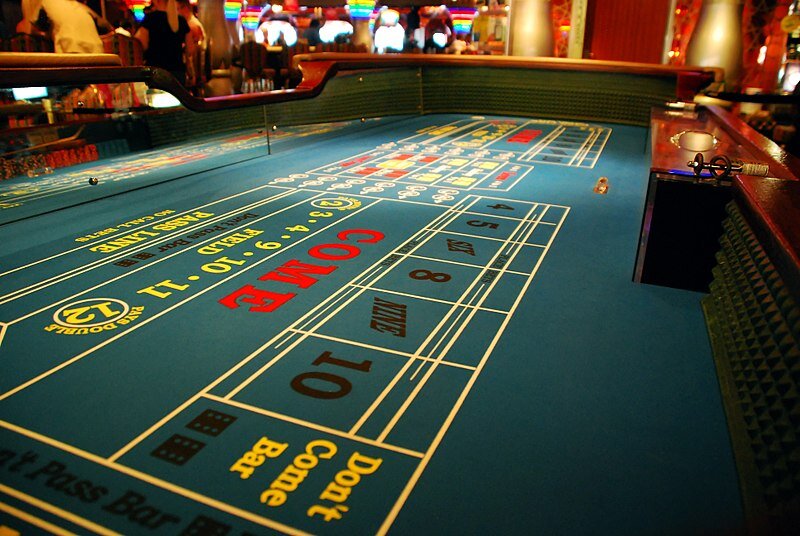30 July 2020
Every now and then when researching a word, you turn up a rather interesting historical character. And in the case of craps, there is not one, but two such men.
Craps is, of course, a dice game, but its name is an odd one. The origin of the game’s name is somewhat uncertain, but it is most likely related to a term used in an older dice game. And we do know that it has nothing to do with crap.
The present-day game of craps is a descendent of an older dice game called hazard, and in hazard a roll of two, the lowest roll, is known as crabs. This term comes from the two pips on the dice, which are said to resemble either the crustacean or crab apples. The term crabs dates to at least 9 January 1768 when the Earl of Carlisle uses it in a letter to our first interesting historical figure, George Augustus Selwyn:
I hope you have left off hazard. If you are still so foolish, and will play, the best thing I can wish you is that you many win and never throw crabs.
Selwyn (1719–91) was a member of the British Parliament, a backbencher—he sat in the House of Commons for forty-four years without ever making a speech. He was member of the notorious Hellfire Club, a group of high society “gentlemen” who reveled in taking part in activities that were generally considered immoral. On the surface, Selwyn was an unambitious, charming wit. He was expelled from Oxford University for mocking the holy communion. He was also an inveterate gambler who happily shrugged off his losses. But he purportedly harbored a taste for the macabre and was said to have enjoyed attending public executions—allegedly sometimes cross-dressing as a woman to disguise himself and, with the hooped skirt, his erections. The darker rumors were that he was a necrophiliac and that he bribed undertakers so he could visit the corpses. On his deathbed, Henry Fox, the first Baron Holland, is recorded as saying, “the next time Mr. Selwyn calls shew him up. If I am alive I shall be delighted to see him, and if I am dead he will be delighted to see me.” But otherwise he seemed to have little other sexual interest in women or in men, although some claim he was homosexual and an earlier version of the Dictionary of National Biography says that “his fondness for children was, however, extreme.” After his death, his friends claimed these darker rumors were slanders by those who did not like him. How much of his alleged sexual proclivities are true will probably never be known.
This is all, however, just an interesting aside.
The name craps for the variant of hazard that we know today first appears in New Orleans. The variant was the invention of our second historical personage, Jean-Bernard Xavier Philippe de Marigny de Mandeville. A descendant of French nobility, Bernard de Marigny was born into wealth in Louisiana. As a teenager, his guardian feared he was developing dissolute habits, and de Marigny was sent to England learn how to be a gentleman. Instead, once there he learned how to gamble and became particularly fond of hazard. He brought the game back to New Orleans with him, altering the rules to his liking. He would spend his life as a land developer and speculator and serving in the Louisiana state senate, but his passion was always dice, and he would blow through several fortunes on his way to dying impoverished.
The name craps is first recorded in 1843, although since this is some time after de Marigny introduced the game to New Orleans, antedatings are likely to be found, especially in writing from New Orleans, particularly works in French. The earliest use I’m aware of is by Jonathan Green (no connection to the slang lexicographer that I’m aware of), who wrote of the evils of the game in his 1843 book An Exposure of the Arts and Miseries of Gambling:
The Game of Craps
This is a game lately introduced into New Orleans and is fully equal to faro in its vile deception and ruinous effects.
And a few years later, the Charleston Courier in South Carolina, on 28 May 1845, reprints this story which had appeared in the New Orleans Bee:
On Tuesday night, Captain Youennes of the First Municipality Police, paid a visit to a room in the St. Fouis Hotel Building, and there found Adolphe Poulard, whom he arrested on a charge of keeping a banking game called “craps.” On making a search $225 30, eighty-five checks, two dice boxes and nine dice were found in the drawer of the gaming table, all of which, with the table were seized.
The most likely explanation for the name craps is that it is simply a variation on crabs, the pronunciation shifting as it moved from English to Louisiana French and then back into English.
A more complex explanation, which is less likely but cannot be ruled out, is that craps is a shortening of crapaud, literally toad in French, and a derogatory epithet for French people. This explanation would have English citizens of New Orleans looking down upon the Creoles who played the game, and called it craps after them.
Sources:
Carter, Philip. “Selwyn, George Augustus.” Oxford Dictionary of National Biography, 3 January 2008.
Charleston Courier (South Carolina), 28 May 1845, 2. Newsbank: America’s Historical Newspapers.
Green, Jonathan H. An Exposure of the Arts and Miseries of Gambling. Cincinnati: U.P. James, 1843, 88. HathiTrust Digital Archive.
Green’s Dictionary of Slang, 2020, s.v. crabs, n.1.
“Letter,” Earl of Carlisle to George Selwyn, 9 January 1768. In John Henage Jesse. George Selwyn and His Contemporaries, vol. 2 of 4. London: Richard Bentley, 1843, .238. HathiTrust Digital Archive.
Oxford English Dictionary, second edition, 1989, s.v. craps, n., crab, n.1.
Photo credit: Lisa Brewster, 2007. Used under a Creative Commons Attribution-Share Alike 2.0 Generic license.

